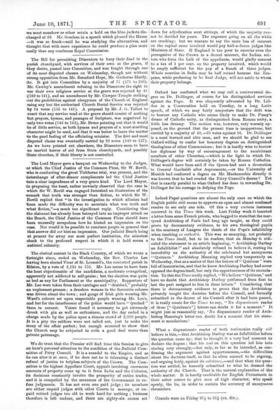Indeed Papal questions are almost the only ones on which
the English public still seems to approve an open and almost confessed resolve to see only one side. Of this a very curious instance occurred in the Times this week. Last Friday week it inserted a letter from some French priests, who begged to state that the mar- tyred Archbishop of Paris had long ago taught, as they could prove by documentary evidence, to his own theological pupils in the seminary of Langres the thesis of the Pope's infallibility when teaching ex cathedra. This was so annoying, not probably to the Times itself, but to its readers, that on Monday it ridi- culed the statement in an article beginning, "Archbishop Darboy an Infallibilist 1" and absolutely refused to believe it, resting its incredulity on the authority of the celebrated but anonymous " Quirinus." Archbishop Manning replied very temperately on Wednesday, that as a matter of fact the letters of" Quirinus " were full of inaccuracies, and that he knew Archbishop Darboy had never opposed the dogma itself, but only the opportuneness of its enuncia- tion. To this the Times coolly replied, "We believe " Quirinus," and have no doubt that Archbishop Darboy performed from first to last the part assigned to him in them letters." Considering :that there is documentary evidence to prove that the Archbishop privately taught the doctrine before the Council, and formally submitted to the decree of the Council after it had been passed, it is really comic for the Times to say, "No dispassionate reader of these [" Quirinus's "] letters can doubt it for a moment." It might just as reasonably say, No dispassionate reader of Arch- bishop Manning's letter can doubt for a moment that his state- ment is mendacious.'


































 Previous page
Previous page